The New York-based soul singer duendita talks gardening, existence, and how the color purple relates to the fact that we are all approximately 13.8 billion years old.
SAMUEL HYLAND
If anyone has seen the duality of the outdoors firsthand, it’s duendita. Just one day after our interview, for instance, in one of many outdoor creative initiatives the New York-based multidisciplinary artist has been able to partake in since the state’s reopening, she and several other demonstrators are scheduled to show up en masse at a protest event in support of Amazon’s prospective first labor union. It’s a beautiful flicker of hope for a city whose grassroots humanitarian culture has taken a considerable hit, but, at the same exact time, a stark reminder of the grim realities imposed by a corporate world bent upon exploitation. Unlike the plethora of moving parts it coexists with, the issue is something that the pandemic has not changed.
“We have such automated worlds, convenient worlds, for these Silicon Valley-ass types,” she muses out loud, getting into the crux of the outing’s intended purpose. “You want the whole world to be automated, and until then, we’re the robots that need to create this world? We’re the people working at the warehouses; we’re the people working in the medical offices putting ourselves on the line, and you’re complaining that you have to wear a mask? We’re the ones packing your groceries, and making sure your deliveries get there, because you don’t want to leave the house.”
Being outside is a spectrum, though – one that can also reveal itself to mean far more beautiful things than the growing need for a fight against modern-day slavery. When I meet with duendita in the cozy outdoor dining area of Cafe Erzulie in Bed Stuy, Brooklyn, she’s excited to talk about her garden. “I planted some cucumbers and eggplant, like, four-five days ago, and they’re already sprouting,” she happily reports. “I’m strapped to my porch right now. I’m excited. You know when they say ‘watched water doesn’t boil,’ and all that stuff? I don’t believe in that. Every single inch of growth on my plants counts to me. I just love to check on them every morning, water them, spend time in my garden, and see what’s changed from the night before… because shit really does pop off overnight.”
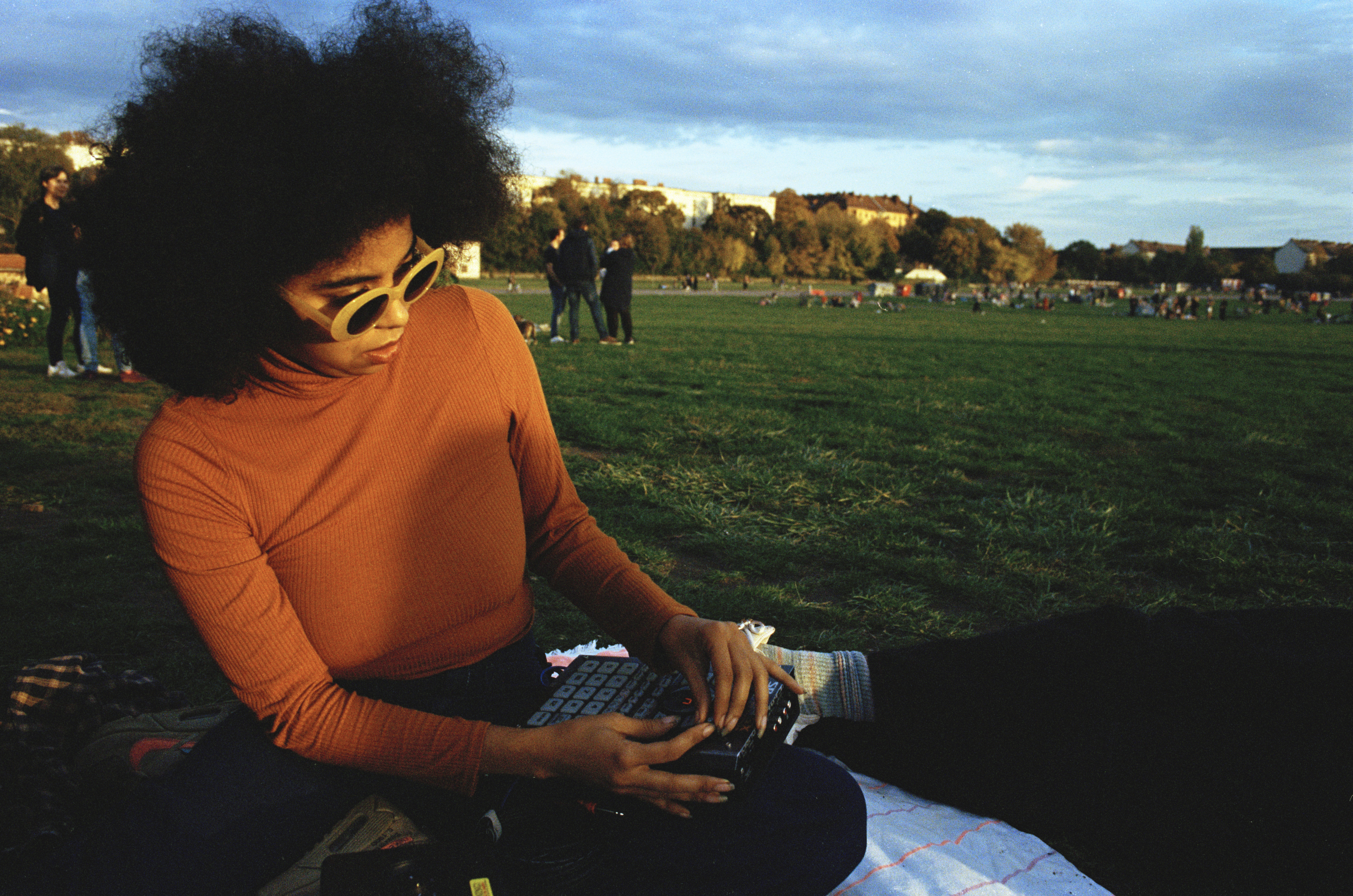
It’s a progress-centric approach that has epitomized duendita’s young career on several fronts up to now. Born Candace Camacho, the singer, now 25 years of age, got her start in music almost exclusively by way of youth choirs and tiny Yamaha keyboards. Years later, at NYU, she spent a semester of her senior year studying abroad in Berlin, Germany – where rather than letting her studies be a primary focus, she worked on a collection of songs for her senior thesis project. The collection would go on to become direct line to My creator, her wrenching 2018 debut EP. It received acclaim – a laudatory 8.1 Pitchfork review and a smattering of magazine features being noticeable returns – but the place it came from was not nearly as bright as the newfound spotlight it brought forth. “It was a beautiful project,” she thinks aloud, “but I was going through a lot at the time. It came from a place of stress- and trying to survive. I lived, for a while, out of my suitcase.” Over the course of our conversation, duendita unravels so many harrowing layers of such a rocky road – abuse, sexual exploitation, and crippling mental episodes included – that we end up reaching an agreement somewhere near the interview’s midpoint: no more depressing shit.
…But as it stands at this point in duendita’s life, it isn’t like there’s much room for depressing shit anyway. The progressive gospel of her garden plants is something that easily grafted itself onto her artistic journey – where she used to be houseless, she now has a place to live. Where she used to be timid, she has now learned to speak up for herself (literally: at several points in our conversation, she stops herself mid-sentence to tone down, whispering vehement apologies to the silent laptop-toters that surround us in the cafe). And, where she used to be silenced by figures more powerful than she was, she’s learning more and more every day to tell her own story. “I’m not in that place anymore,” she says, between sips of lemonade. “I have shelter. I have a place to live. Going from being houseless, to having a house… going from risk and danger, into safety… it makes you a different person on a molecular level. I’m very blessed to have what I need in order to eat and sleep, and I never want to go back to the times when I didn’t.”
“Because we’re here right now, that means we have not died. And that is awesome. The spirit of us has not died.”
Looking at duendita up-front, one would never guess that the hole she dug herself out of was ever as deep as it turns out to have been. When she emerges through the door marked PLEASE CLOSE BEHIND YOU en route to the small, round table I’m seated at outside, she looks like someone fresh out of a swanky Vogue cover shoot packed with eccentric European photographers with handlebar mustaches who seem to be obsessed with retro-futuristic aesthetics: she’s wearing a vibrant lavender dress; she’s got a pair of equally lavender-tinted reflective goggles over her eyes to match; and even her socks, she reveals to me later on, were exclusively designed by a prolific multi-disciplinary artist who happens to be a friend of hers.
Her choice of the color purple is more intentional than it appears at first glance. On top of it being her favorite hue, it’s also the only thing that makes sense to her right now. When I ask why purple specifically, she takes a lengthy pause, gazing up towards a spot in the distance that she speculates may be the site of a nest-building operation by local doves. “I really felt existential about it,” she starts, prefacing a more extended history with the color. “If a purple flower can grow and be this beautiful, and I’m a part of this world too, then that must mean I’m connected to something that is that is the source – something that is deep and naturally occurring. Flowers in general inspire me. All they want to do is grow towards the sun, and then die. That’s exactly the journey I’m on.”
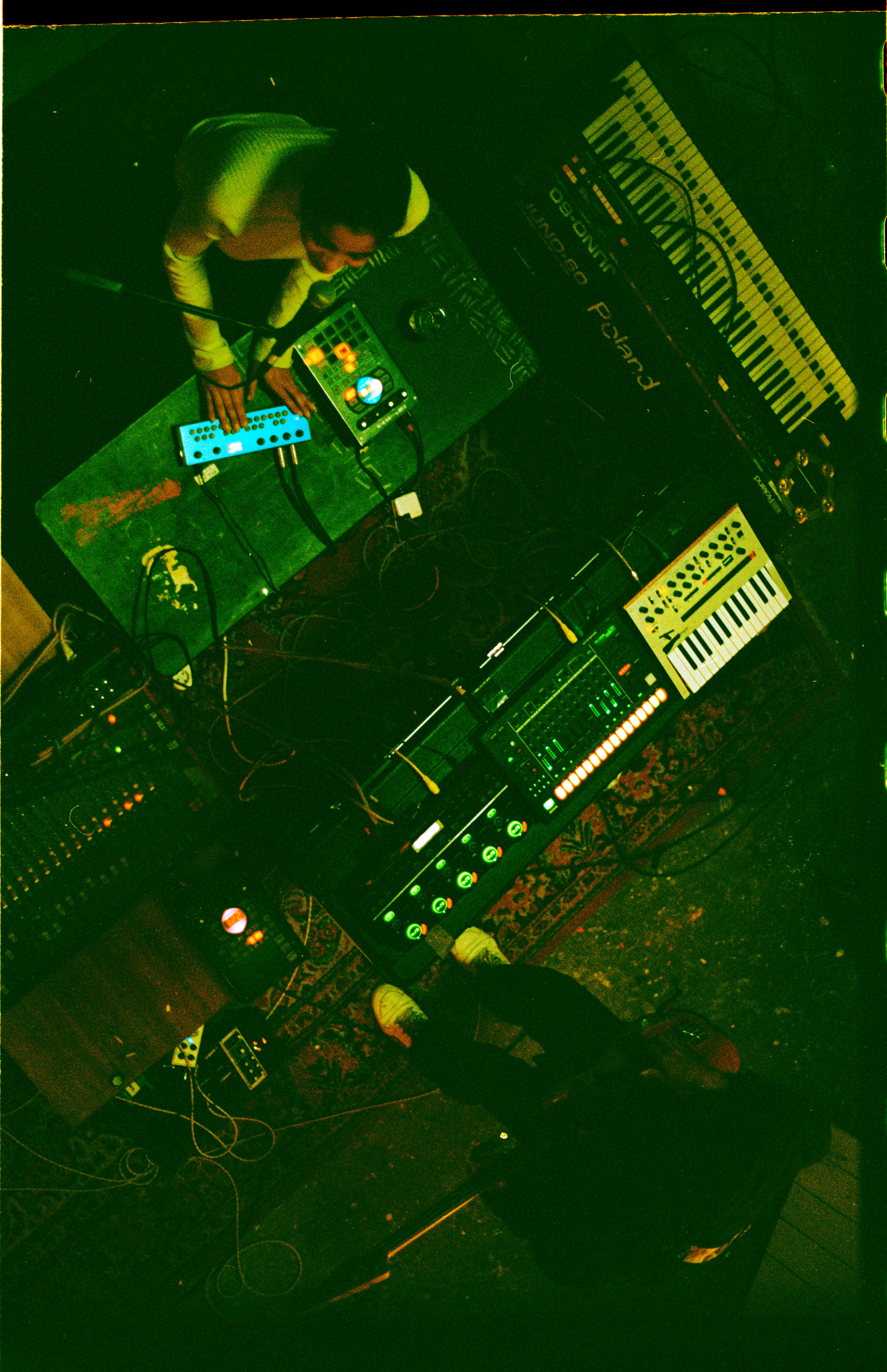
There are several points in our chat where people stroll through that same aforementioned PLEASE CLOSE BEHIND YOU door to the cafe’s outdoor seating section. Almost routinely, duendita glances over her shoulder after seeing them in her peripheral vision, and it takes no time at all for it to become clear that they know each other. Her eyes widen. She holds out her arm for an embrace. She makes small talk about things she has lined up for the rest of the day. With one person, a multi-talented musician friend named Ben, she extracts a hand-crocheted wool tape recorder container from her purse and lightheartedly models its features. When another visitor, an owner of Cafe Erzulie named Mark, passes by, she excitedly runs through plans to go to the Botanical Garden later on this afternoon, before introducing him to me as the friend who took her into his home over quarantine. “We just went over the life story,” she chuckles, when I tell him I was just saying he was a real one for that. “Now we’re at the happy part.”
Standing beside her, a tall presence in a snapback baseball cap, Mark lets off a steady laugh. “It was a very easy decision to make,” he says, before leaving us to it.
The influx of familiar visitors is a dynamic that holistically illustrates duendita’s community-oriented outlook. As she simultaneously pursues both an intimate relationship with, and deeper understanding of, the world that surrounds her, the expanse of people she has encountered in this lifetime holds the same sacred weight as the spiritual quest she’s grown to embrace. In one oft-cited line from her 2018 single ‘Pray,’ she croons matter-of-factly, over a bubbly instrumental backing, “I pray to My God and My Mom because they’re both the same.” When I ask her about this, she explains – just as matter-of-factly as she sings the line – that “I came out of my mom. The fork? That is life.” She continues on, as her gaze slowly wanders back to the prospective dove’s nest being constructed off in the distance. “Beyond my mom – our whole lineage of people who lived, who survived, and made it possible for us to be here right now – because we’re here right now, that means we have not died. And that is awesome. The spirit of us has not died.”
“I like to think that I’m, like, 13.8 billion years old… because I am. I’m as old as the universe. So are you. And that’s the way we should treat each other.”
There are several fragments of her immediate network that connect duendita to such a common existential creed. In one example that comes up, after getting a notification on her phone at some point, she’s quick to ask me whether I’ve heard of the Brooklyn-based rapper MIKE. (The notification was related to a single he put out ahead of his upcoming seventh studio album Disco!). When I say yes, she recalls in detail a time that she listened to the album at his house. “It was like a flashback: it was so beyond joy that it was in my veins,” she starts. “It’s just so good for our life, and for our joy, and for our lineage, and for our community that this (MIKE’s music) exists. It means the world to me.”
The most striking flash of her community-based outlook, however, comes a short time after duendita explains to me why she likes the color purple so much. She mentions something about having been with her friends for billions of years; I abruptly follow up to challenge how literal that statement really is. In the moment, I’m convinced that she’s exaggerating about how long her close relationships have lasted. I expect for her to answer my question with a cute oral history of how she met her closest confidants. My expectations are proven very wrong.
“I’m always thinking about how we’re all in some sort of lineage, and how we all came from somewhere – and then maybe that somewhere was a tiny little cell, or a tiny little idea, billions and billions of years ago, that catapulted into whatever situation we’re in now, billions of years later,” she tells me. Her eyebrows raise a bit. “I like to think that I’m, like, 13.8 billion years old… because I am. I’m as old as the universe. So are you. And that’s the way we should treat each other.”
She takes a brief pause. A few seconds pass, and a sly smile creeps its way onto her face.
“But not on some all lives matter shit.”
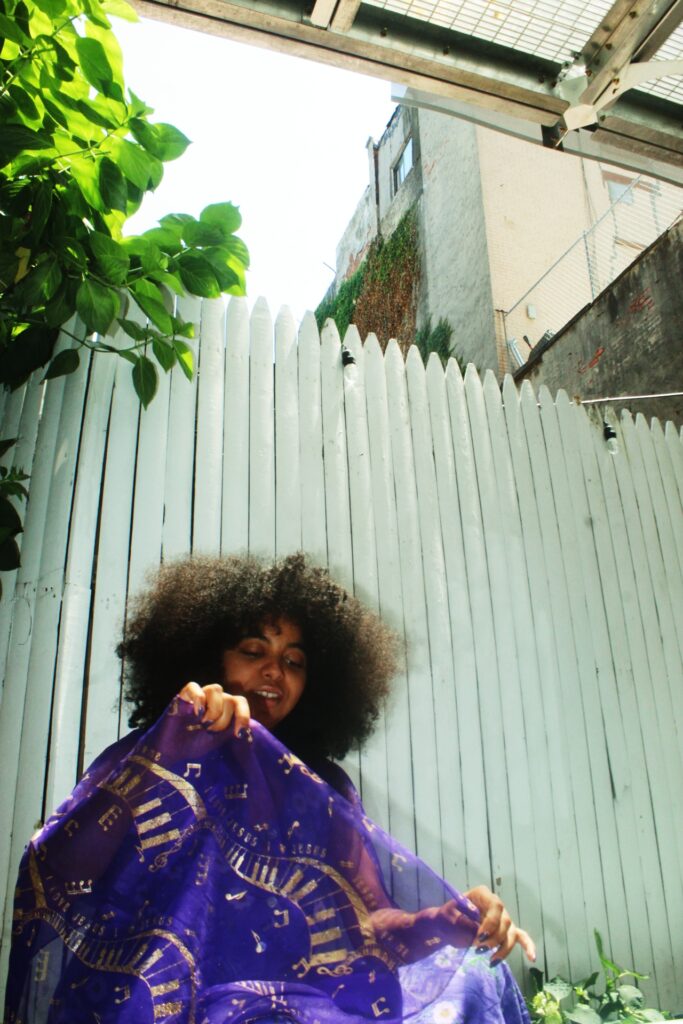
At some point in our chat, after giving me some info related to where she lives, duendita is adamant about those locational details being off the record. She’s become a community staple of sorts – people often walk by her house, she explains to me, and tell her that they love her music. But there are also creeps. And in both cases, as someone who prefers to spend a great deal of her time outdoors tending to plants and smoking good weed, a level of privacy is preferred.
Before duendita was anywhere near the level of artistry such a concern suggests, a great deal of her work was primarily for the purpose of making ends meet. It’s a big part of why our meeting place of Cafe Erzulie is so dear to her: when she was struggling financially several years ago, it was always a surefire spot for quick rent money.
“I started playing gigs here with a full band – six-piece band – in 2017-18,” she recounts, upon being asked about her relationship with the restaurant. “And then I just kept playing gigs here. It became this situation where I knew I could sell it out. I could make my rent in one night and be good. So if I needed a sublet, or if I needed a place to live, I knew I could throw a show at Erzulie, and that I could work with Mark and they’d hold me down.”
“I’m making music because I need to make music. I’m making music like how I sweat. It’s an excretion. It’s natural.”
It’s getting closer and closer to noon, and the sunlight is incrementally sliding its way across the tiny metal table we’re seated at – overhead, not too far behind the work-in-progress dove’s nest, you can hear express trains roaring into the Myrtle Avenue-Broadway Subway station every five minutes or so. The city-integral aura of the cafe is an intrinsic factor in its presence as a staple of Brooklyn’s nightlife. “In recent years, the café has become a gathering place for a subset of the borough’s Black queer scene,” The Cut wrote this past March. “This was the venue that Cake Robles, a tattoo artist, and Britt Tabor, a community organizer, chose for their wedding reception. This was a spot where emcee Nappy Nina co-hosted Joy Party BK, a monthly day party that featured a rotating cast of well-dressed melanated characters.” One can imagine bustling, pre-COVID crowds of dapper locals filing into the cafe’s outdoor space for an evening’s festivities. And – at the same time that one can imagine this very scene – one can also picture how helpful the money could have been to someone struggling with rent, once it was multiplied by several nights.
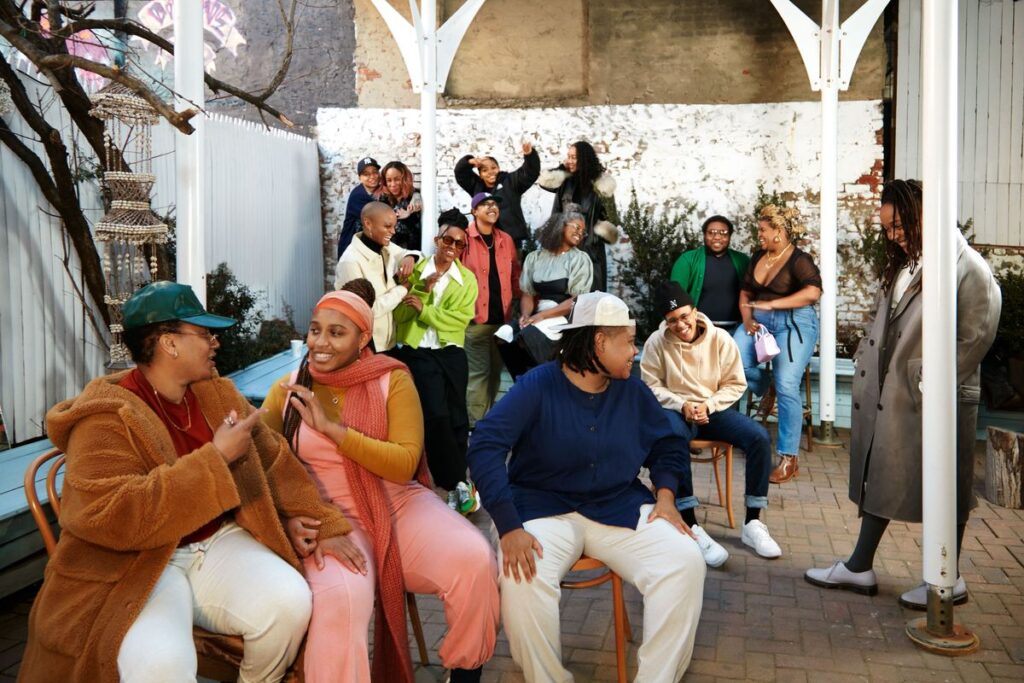
But the dependency that duendita grew to exhibit as a result of this, in tandem with looming mental health issues steeped from unresolved traumas, boxed her output into something that exclusively only came out of either monetary need or pain.
At some points in direct line to My Creator, the circumstances seem to inadvertently peek through the cracks. On tracks like ‘Yikes!’, for instance – a ballad about an elusive lover whose tendencies end up in heartbreak – the opening seconds alone register as the part in a gut-wrenching tearjerker film where the innocent protagonist realizes, standing underneath a torrential downpour without an umbrella, that he has already missed his only concrete chance at success in life. “Oh my, even though it feels right,” the voice howls over somber strings and a sprinkling of keys, “I’ll never get the same chance twice. This, I know now.”
‘Blue Hands,’ too, only lasts about one minute before it fizzles into indistinct background chatter. There are six lines, each one rolling off the tongue of their creator with the same gradual intensity as the soundscape that surrounds them all. “Send help, I’m drowning in this air,” the song opens. “You can’t see it but it’s there. Every time I sigh, I’m reminded I could die in blue hands.”
Duende, the etymological namesake of duendita’s stage title, was described by Pitchfork in a 2019 interview as “that inexplicable, mysterious feeling when a piece of art makes the hair on your arms stand up.” Speaking with her about her debut album, I ask whether this sensation is what she is making music to get listeners to feel. She responds so quickly that I barely have time to finish my question: “I’m making music because I need to make music. I’m making music like how I sweat. It’s an excretion. It’s natural.”
It goes back to the slow-but-steady progress of the plants in her garden. For duendita, pursuing creativity as a form of excretion, rather than one of escapism, is a monumental transition that took shape in tiny, practically indistinguishable steps. Several years ago, for one, when she was a timid child growing up in the depths of Queens, New York, the invisible boundaries set by her own mental state contrasted with the physical world in ways that only impacted things for the worse. At more than one instance in our chat, she alludes to the fact that, throughout her formative years, she was not nearly as in control of her self-expression as she is now. In one intriguing quote from the aforementioned 2019 Pitchfork interview, she mentions that her mother encouraged her to be creative, “not so that I could be something, but so I could be OK.”
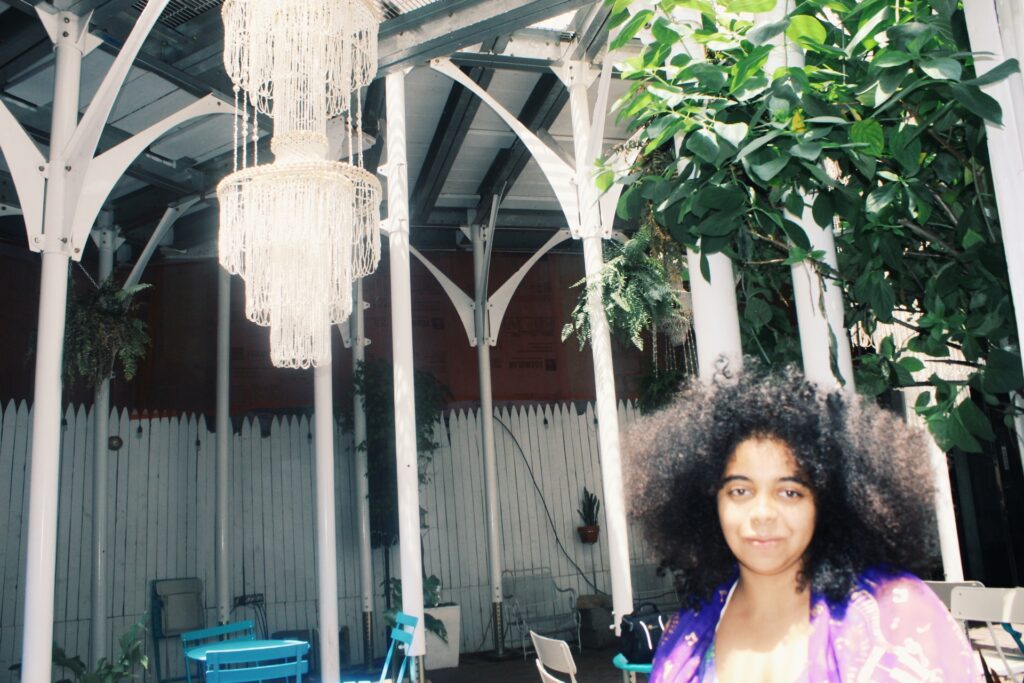
“She always encouraged me to make art,” she tells me of her mother today, in slow and deliberate words. Some pauses are longer than others. “And whether she knew it or not, it was keeping me alive. Whether she knew it or not, going to choral rehearsal was everything to me. Singing with people was everything to me. Learning songs in German, French, Italian… everything to me.”
The full essence of her plant-like progress, however, manifests itself in a distinct moment near the end of our conversation: right after she goes through this part of her story, I ask for an update on the state of things pertaining to her mother’s advice. How much of your work right now is so that you can be something, and how much of it is so that you can be OK?
“My work right now is just about being at this point,” she says. “Just being. Not being OK, but just being. I think I’m really content, really safe, really happy. No one’s chasing after me right now; there’s nothing on my back, I’m not running from anyone or anything. I’m not in harm’s way. At this point I’m just making to make.”
The compelling thing about duendita’s journey is that she has seen both ends of several spectrums firsthand. Just like the outdoors is a double-edged entity, so are the compasses between sane and insane, well and unwell, housed and houseless. Having seen the fullness of each extreme, yet, allows her to address her entire audience at the elusive even playing field they all are considered upon in a perfect world – because, after all, we’re all 13.8 billion years old. And that’s the way we should treat each other. But not on some all lives matter shit.
“It’s okay if you’re going through it right now: cut some stems, cut some leaves. Figure out where you need to put your energy, and figure out what needs to be done to make sure that you bloom and blossom.”
We close our interview a little after noon, as the number of silent computer-toters in the cafe’s outdoor dining area seems to have noticeably expanded. I ask duendita what’s up next for her specifically, but – as has happened frequently up to this point – it doesn’t take long for her to digress into gardening.
“Things don’t come to stay; they come to pass,” she starts off, citing an adage from her current boss. “Your thoughts, your feelings – they’re not forever. They change; there’s room for growth. Room to plant new seeds, and to water them, and wait, and watch them grow and flower, and be towards the Sun until they die.”
A smile seems to be trying to sneak onto her face, and the midday sun is egging it on. Within seconds, she starts beaming.
“It’s okay if you’re going through it right now: cut some stems, cut some leaves. Figure out where you need to put your energy, and figure out what needs to be done to make sure that you bloom and blossom.”
The grin on her face as I leave her at the cafe – one that has survived far more than it makes you think it has – is a sure sign that as the plants in her backyard are blossoming, she is, too.

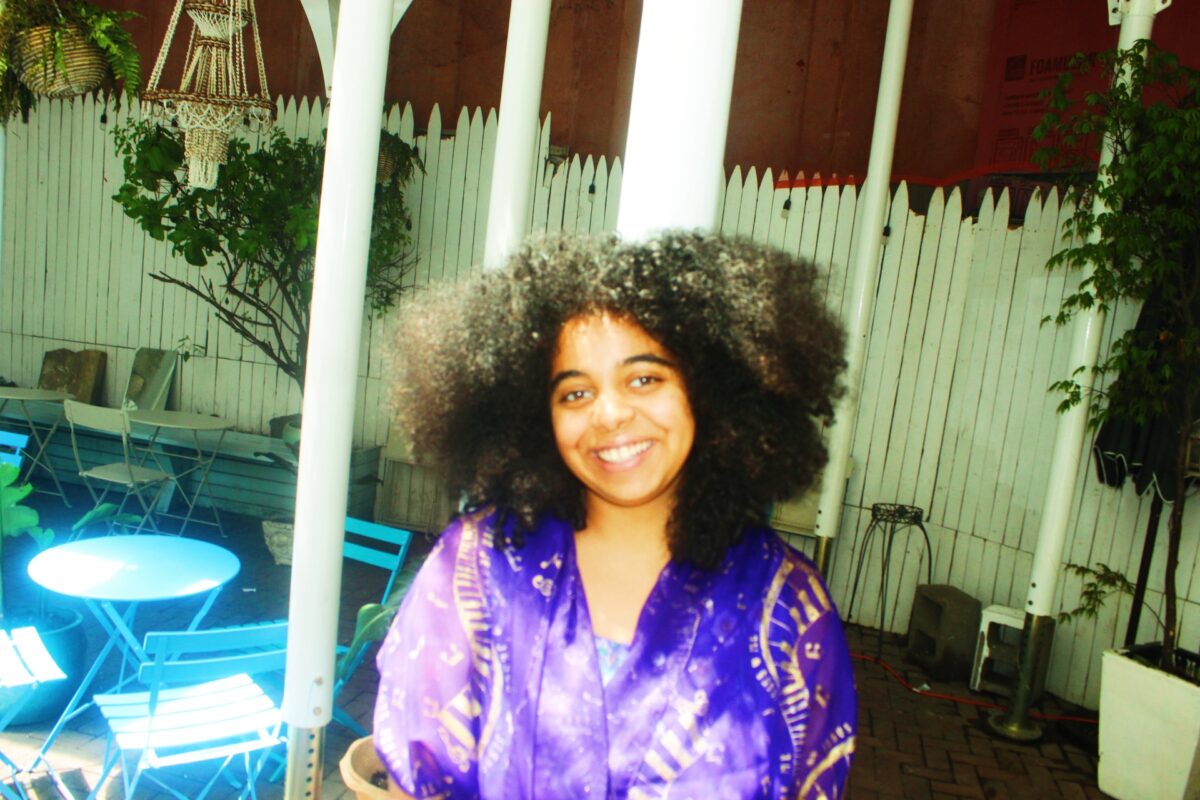
One reply on “duendita is 13.8 Billion Years Old, and So Are You”
love